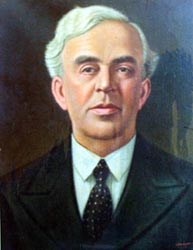
The Founder

Sir Robert McCarrison
National Institute of Nutrition (NIN) was founded by Sir Robert McCarrison in the year 1918 as ‘Beri-Beri’ Enquiry Unit in a single room laboratory at the Pasteur Institute, Coonoor, Tamil Nadu. Within a short span of seven years, this unit blossomed into a "Deficiency Disease Enquiry" and later in 1928, emerged as full-fledged "Nutrition Research Laboratories" (NRL) with Dr. McCarrison as its first Director. It was shifted to Hyderabad in 1958.At the time of its golden jubilee in 1969, it was renamed as National Institute of Nutrition (NIN).
Achievements|
The stepping stones
The Institute has been recognized by many national and international agencies as Centre for conducting advanced as well as ad-hoc training courses in nutrition and laboratory animal sciences. In addition, several reputed universities have recognized NIN as a Centre for Ph.D programmes in different disciplines.
It possesses sophisticated equipment and swell-equipped
modern facilities and for clinical, laboratory and community based research. Nutrition
Wards with adequate inpatient and outpatient facilities are available at hospitals
viz., Niloufer Hospital for Women and Children, Government Maternity Hospital and
Osmania General Hospital to carry out research in clinical nutrition. The "Nutrition Museum" of the institute is an important teaching tool which highlights different aspects of food and nutrition and also covers the work undertaken at the Institute. |
NIN's birth place at Coonoor, Tamil Nadu |
|
|
Objectives
To identify various dietary and nutrition problems prevalent among different segments of the population in the country.
To continuously monitor diet and nutrition situation of the country.
To evolve effective methods of management and prevention of nutritional problems.
To conduct operational research connected with planning and implementation of national nutrition programmes.
To dovetail nutrition research with other health programmes of the government.
Human resource development in the field of nutrition.
To disseminate nutrition information.
To advise governments and other organisations on issues relating to nutrition
Evidence based inputs on food and nutrient consumption patterns; trends in nutrition status of population across age and physiological groups; Micro and Macronutrient values of foods, maternal and child nutrition, NCD biomarkers, Environmental pollution/toxins affecting health, Drug nutrient interaction, Nutrition and immune response.
Recommended Dietary Allowances (RDA), Dietary Guidelines for Indians, Diet and Diabetes, Diet and Heart Diseases, Diet during Pregnancy (region-specific guidelines), Nutrition and Infection
National Nutrition programmes such as Integrated Child Development Services (ICDS), Mind-day Meal (MDM) programme, Clinical Management – Severe Acute Malnutrition (CM-SAM) & many state level Nutrition programs; Vitamin A prophylaxis, Iron and Folic Acid Supplementation, Double Fortification of Salt (DFS) with iron and iodine, Recommendations on vegetable oils Food fortification guidelines to the Food Safety and Standards Authority of India (-FSSAI), Food and ground water regulations (yellow mustard, flourosis, lead)
We broaden knowledge and understanding of how nutrition and balanced diets coupled with physical activity and lifestyles can help improve mental and physical wellbeing and how they can reduce communicable and non-communicable diseases by developing tools, sharing best practices, and holding engaging public events. NIN Mob App, e- Learning modules and host of videos and pamphlets
Two full time MSc courses, short term certificate courses, Ph.Ds, two training programes for medical college faculty and public health personnel, Anthropometry assessment, Nutrition & Dietary assessment, National fluorosis training, PCT for regulatory bodies, Animal handling. Added to these, custom-made training programmes on demand in adhoc mode
Extending support to Governments/ICMR to explore, assess and combat public health issues and outbreaks – Kidney diseases in Nellore district of Andhra Pradesh; deaths in tribal areas of Attapady in Kerala, Food and water borne illnesses in Bholakpur area of Hyderabad, Rapid assessment of nutritional status of children in areas affected with acute encephalitis syndrome (AES) in Muzzaffarpur, CoVID 19 and so on